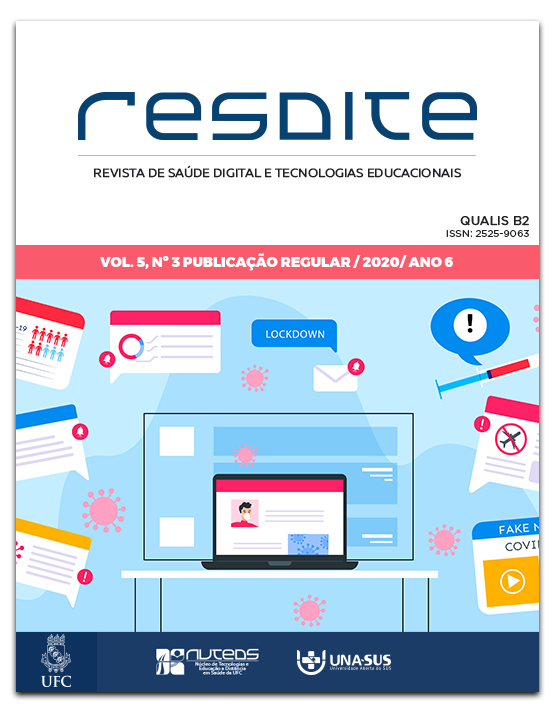Evolução da literacia digital e sua importância para os trabalhadores da saúde na era da inteligência digital
DOI:
https://doi.org/10.36517/DOI:10.36517/resdite.v5.n3.2020.a8Parole chiave:
literacia digital, saúde digital, inteligência digitalAbstract
Introdução: Este estudo tem como objetivo identificar as aplicações do conceito de literacia digital na área de saúde digital e identificar instrumentos para medir o nível de literacia digital dos trabalhadores da saúde. Métodos: Trata-se de revisão integrativa de literatura com uso dos descritores “digital literacy” e “health” aplicados nas bases indexadas ERIC, Periódicos CAPES e PubMed. Foram localizados 121 artigos cuja seleção de 16 artigos possibilitou identificação de três frameworks internacionais. Resultados: Existem diferentes abordagens possíveis para o desenvolvimento da literacia digital como a prática baseada em evidências, desenvolvimento baseado em projetos, uso de redes sociais, elaboração e aplicação de frameworks, e aplicação de instrumentos de avaliação. Identificou-se que o framework de inteligência digital foi desenvolvido com base na compilação de outros 25 frameworks sobre literacia digital e que sua aplicação possibilita a avaliação de 24 competências em três níveis: cidadania digital, criatividade digital e competitividade digital. Conclusão: Existem modelos internacionais de avaliação de literacia digital e estudos que comprovam sua importância. Há uma lacuna para o desenvolvimento de um instrumento específico de autoavaliação de literacia digital com foco em trabalhadores da saúde no Brasil com base no modelo de inteligência digital.
Downloads
Riferimenti bibliografici
Brasil. Estratégia de e-saúde para o Brasil. Brasília: Ministério da Saúde, Comitê Gestor da Estratégia e-Saúde; 2017.
OECD. OECD Future of Education and Skills 2030. [Online].; 2018 [cited 2020 may 17. URL: https://www.oecd.org/education/2030-project/contact/E2030_Position_Paper_(05.04.2018).pdf.
Hull GA, Mikulecky L, St. Clair R, Kerka S. Multiple Literacies. A Compilation for Adult Educators. 2003.
Quaglio G, Sørensen K, PR, Bertinato L, Brand H, TK, et al. Accelerating the Health Literacy Agenda in Europe. 2016; 32: p. 1074-1080.
Kuek A, Hakkennes S. Healthcare staff digital literacy levels and their attitudes towards information systems. Health Informatics Journal. 2019.
Souza MTd, Silva MDd, Carvalho Rd. Revisão integrativa: o que é e como fazer. Einstein. 2010; 8(1).
Belshaw D. The Essential Elements of Digital Literacies; 2014.
Stocchetti M. Media and Education in the Digital Age: Concepts, Assessments, Subversions Berlin: Peter Lang; 2014.
Hübner U, Shaw T, Thye J, Egbert N, Marin HdF, Chang P, et al. Technology Informatics Guiding Education Reform – TIGER - An International Recommendation Framework of Core Competencies in Health Informatics for Nurses. Methods Inf Med. 2018: p. e30-e42.
Institute DQ. DQ Global Standards Report 2019 - Common Framework for Digital Literacy, Skills and Readiness. Cingapura: DQ Institute; 2019.
Ellis RA, Bliuc AM, Goodyear P. Student experiences of engaged enquiry in pharmacy education: digital natives or something else? High Educ. 2012: p. 609–626.
Kaur S, Sidhu GK, Fong ll, Jamian lS. Supervisory and digital literacy practices in postgraduate supervision: a case study. In society iiafdoti, editor. Proceedings of the 12th international conference on cognition and exploratory learning in the digital age (celda 2015); 2015. P. 35-42.
Hill L. Digital Literacy Instruction for eHealth and Beyond. ORTESOL Journal. 2016.
Tzoc E, Ubbes VA. The Digital Literacy Partnership Website: Promoting Interdisciplinary Scholarship between Faculty, Students, and Librarians. New Review of Academic Librarianship. 2017.
Russell F, Rawson C, Freestone C, Currie M, Kelly B. Parallel Lines: A Mixed Methods Impact Analysis of Co-Curricular Digital Literacy Online Modules on Student Results in First-Year Nursing. College & Research Libraries. 2018 Nov: p. 948-971.
Deaves A, Grant E, Trainor K, Jarvis K. Students' Perceptions of the Educational Value of Twitter: A Mixed-Methods Investigation. Research in Learning Technology. 2019.
Mesko B, Gyorffy Z, Kollár J. Digital Literacy in the Medical Curriculum: A Course With Social Media Tools and Gamification. JMIR Medical Education. 2015: p. e6.
Galbán PA, Vidal NV. Digital Literacy Program for the Use of Social Media, Aimed at Health Professionals. MEDINFO 2019: Health and Wellbeing e-Networks for All. 2019.
Sterponi L, Zucchermaglio C, Alby F, Fatigante M. Endangered Literacies? Affordances of Paper-Based Literacy in Medical Practice and Its Persistence in the Transition to Digital Technology. Written Communication. 2017: p. 359-386.
King K. Education, Digital Literacy and Democracy: The Case of Britain's Proposed 'Exit' from the European Union (Brexit). Asia Pacific Education Review. 2019: p. 285–294.
McKinstry C, Iacono T, Kenny A, Hannon J, Knight K. Applying a digital literacy framework and mapping tool to an occupational therapy curriculum. Aust Occup Ther J. 2019: p. 1-8.
Mesko B, Győrffy Z. The Rise of the Empowered Physician in the Digital Health Era: Viewpoint. J Med Internet Res 2019;21(3):e12490. 2019: p. e12490.
Almond H, Cummings E, Turner P. Empowerment, Digital Literacy and Shared Digital Health Records: The Value of ‘nothing about me without me’. Digital Health: Changing the Way Healthcare is Conceptualised and Delivered. 2019.
Terry J, Davies A, Williams C, Tait S, Condon L. Improving the digital literacy competence of nursing and midwifery students: A qualitative study of the experiences of NICE student champions. Nurse Education in Practice. 2018: p. 192-198.
Campbell CJ, McDowell DE. Computer Literacy of Nurses in a Community Hospital: Where Are We Today? J Contin Educ Nurs. 2011: p. 365-370.
##submission.downloads##
Pubblicato
Fascicolo
Sezione
Licenza
Os originais aceitos e publicados tornam-se propriedade da Revista Brasileira de Tecnologias Educacionais em Saúde. A revista adota a Licença Creative Commons, CC BY-NC. É possível acessar, baixar (download), copiar, imprimir, compartilhar e distribuir os artigos publicados conosco, desde que para uso não comercial, mencionando a RESDITE e atribuindo os créditos de autoria. A revista permite que os autores distribuam a versão do trabalho publicada conosco (ex.: em repositórios institucionais), desde que seja reconhecida a autoria e a publicação inicial na RESDITE.

